![]()
16.04.2014
POST RELEASE
Cross-border Commission on the development of the Dnieper-Vistula waterway started its work in Brest
A permanent Commission was formally established within an international conference on restoration of the E40 waterway, which took place in Brest (Belarus) on 27-28 March 2014. The Commission consists of representatives of ministries, water management departments, regional and local authorities, research institutes, civil society organizations from Belarus, Poland and Ukraine.
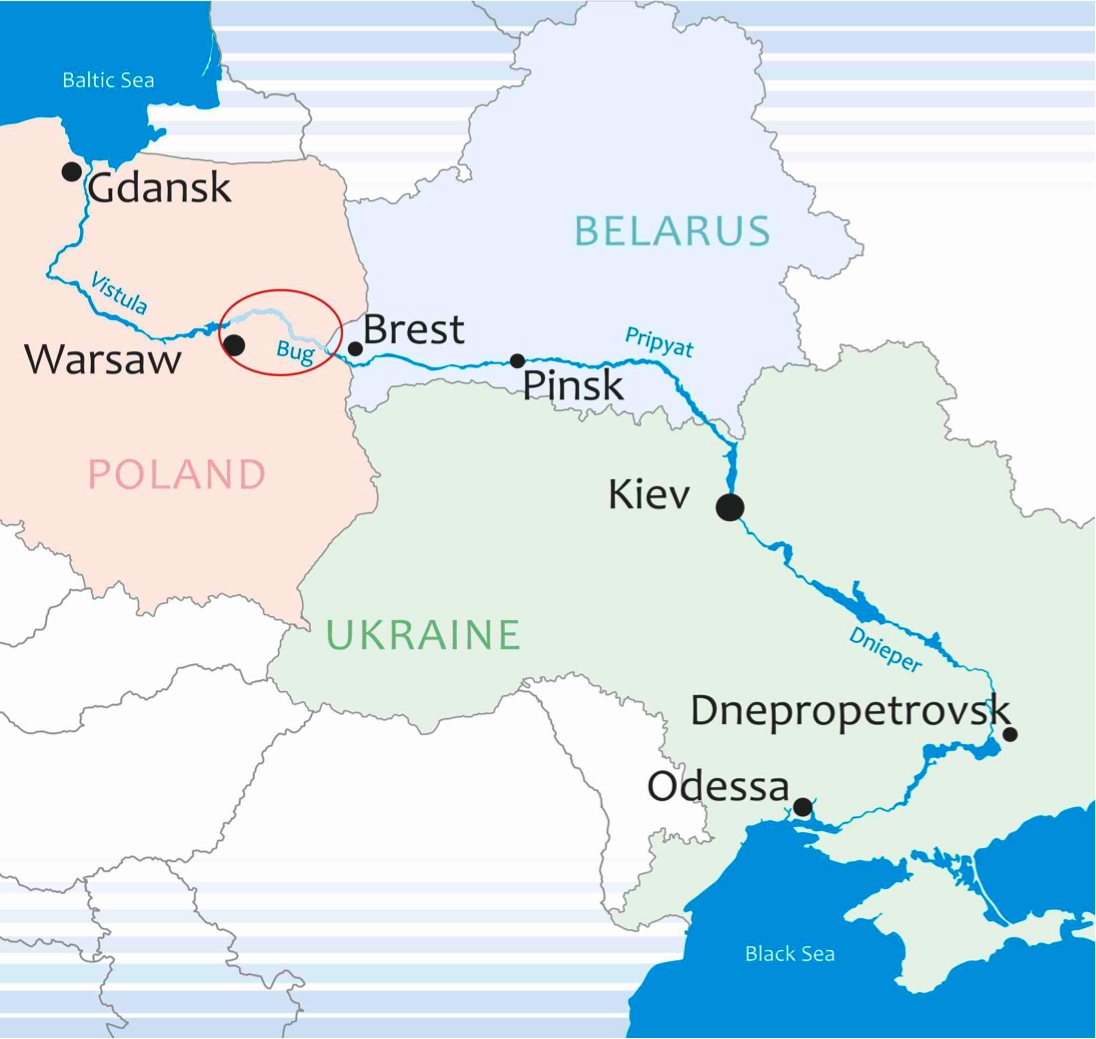 E40 waterway connects the Baltic and the Black Seas; at the moment, this water transport connection is only used on the section from Brest to Kherson, because section from Brest to Warsaw along the Zapadnyi Bug (Western Bug) river is not navigable. A recently launched EU-funded project “Restoration of the E40 waterway on the Dnieper-Vistula section: from strategy to planning” aims to develop a comprehensive feasibility study for the E40 restoration, to identify the most economically efficient and environmentally friendly scenario for the waterway restoration, as well as to promote the idea of the E40 restoration on the national and international level. The conference in Brest was held as part of this project.
E40 waterway connects the Baltic and the Black Seas; at the moment, this water transport connection is only used on the section from Brest to Kherson, because section from Brest to Warsaw along the Zapadnyi Bug (Western Bug) river is not navigable. A recently launched EU-funded project “Restoration of the E40 waterway on the Dnieper-Vistula section: from strategy to planning” aims to develop a comprehensive feasibility study for the E40 restoration, to identify the most economically efficient and environmentally friendly scenario for the waterway restoration, as well as to promote the idea of the E40 restoration on the national and international level. The conference in Brest was held as part of this project.
Experts believe that restoration of the Dnieper-Vistula waterway will make it possible to transport up to 4 million tons of cargo per year and to optimize the load on railway and motor transport. Estimations show that one flap top barge with 900 tons capacity substitutes 18 railway coaches or 45 trucks. Water transport is also much more environmentally friendly: CO2 emissions from inland water transport are 1.5 times less than from railway transport and 5 times less than from road freight transport.
First day of the conference featured key speeches of experts from three countries on the significance of the E40 waterway and prospects for its development. Mr. Aleksandr Shishko, Deputy Minister of Transport and Communications of the Republic of Belarus, pointed out great significance of the E40 restoration idea for the participating countries by putting particular emphasis on the advantages of water transport. ‘Water transport is the cheapest and the most environmentally friendly transport. A river is not just a waterway; it also has to do with water resources, ecology and cheap means of cargo transportation. Even now, when we construct large objects in the Republic of Belarus, we mostly use waterways to transport big-sized cargoes,’ said Mr. Shishko.
Significance of the E40 restoration project was pointed out not only by Belarusian participants, but also by international experts. Professor Zbigniew Zioło, member of the Polish Academy of Sciences, talked about the role of this project in the context of restoration of the Dnieper-Bug-Vistula-Oder waterway, which will help to connect Berlin with the Black Sea. ‘Implementation of this project should be regarded from the point of view of European Union’s interests,’ said Prof. Zioło. ‘Restoration of water connection between the Baltic and the Black Seas will make it possible to increase trade volumes by thanks to the cheaper transportation of goods between the Western, Central and Eastern Europe.’ Ms. Martine-Sophie Fouvez, Regional Advisor of the UNECE Transport Division, was also quite supportive of the E40 restoration idea. ‘Europe is interested in investing into this idea. Of course, it will be a very expensive and long-term project, and we cannot expect quick return of investments. This is a very important step, and we hope that governments of the partner countries will actively support restoration of this waterway,’ said Ms. Fouvez.
Willingness of Poland, Belarus and Ukraine to commonly promote this idea manifested itself in adoption of the Declaration on support of activities aimed at comprehensive feasibility analysis of the E40 waterway restoration project. Project partners from three countries also signed Rules of Procedure of the Commission on development of the E40 waterway on the Dnieper-Vistula section, which will regulate activities of this newly established body.
First day of the conference also featured a visit to the Trishin water works facility in Brest and Kobrin water works facility in Kobrin, where the conference participants were introduced to recently reconstructed hydraulic facilities of the Dnepro-Bug waterway, including flow-through dams, pound locks and small hydro plant.
Second day of the conference was the day when Commission on development of the E40 waterway on the Dnieper-Vistula section started its work. After four working groups had been formed, Commission’s members were challenged with a task to discuss various aspects of E40 restoration and to formulate their proposals for adjustment of the terms of reference for the E40 restoration feasibility study.
First working group of the Commission, moderated by Mr. Aleksandr Zakharenko, Deputy Head of Sea and River Transport Office of the Ministry of Transport and Communications of the Republic of Belarus, was discussing E40 restoration idea in the context of water transport development and cross-border economic development. Members of the working group pointed out that implementation of the project will have positive influence not only on the development of cross-border territories, but, in on a broader scale, on the economic development of Belarus, Poland, and Ukraine. 1st working group stated that restoration of the E40 waterway will open up great prospects for the development of multimodal cargo transportation with active use of water transport in the West-East direction, as well as for the development of other field of economic activity, such as logistics, hydroenergy, tourism and recreation. ‘E40 waterway will not only make it possible to solve cargo transportation issues, but will also have huge impact on the development of water tourism and adjacent infrastructure, as well as development of smaller villages and towns,’ said Ms. Luybov Maksimova, Head of Tourism Department of the Sports and Tourism Ministry of the Republic of Belarus.
Members of the second working group of the Commission were offered to discuss prospects for development of the E40 waterway in the context of spatial planning of cross-border regions, keeping in mind such issues as transport infrastructure, land use, ecology, trade and economics, tourism, etc. Group moderator Prof. Zbigniew Zioło (Poland) voiced the group’s common opinion that Western Bug, due to its environmental significance, cannot be used for navigation. This means that a new canal will have to be constructed in order to restore the E40 waterway. In order to consider all spatial planning aspects, this option needs to be thoroughly analyzed, which will be the main task of a subcontracted organization that will develop the feasibility study for the E40 restoration. Second working group also suggested that all available scientific research on the issue of E40 restoration be published as a separate collection of articles.
Third working group of the Commission, moderated by Mr. Mikhail Kalinin, expert of the international public organization “Ecoproject” (Belarus), looked at the E40 restoration idea from the point of view of environmental protection and sustainable development of cross-border water resources. Members of the 3rd working group included environmentalists, experts of research institutes in Belarus, Poland and Ukraine that deal with management of water resources, land use and environmental protection, as well as design institutes, universities and even mass media. Main point of discussion was the question of how to reconcile the idea of constructing a new canal between Dnieper and Vistula with the interests of environment that will be definitely touched upon while implementing the E40 restoration project. This question is especially relevant for Poland, where all investment projects related to NATURA 2000 territories are subject to close attention and critique on the part of environmental organizations. As the result of discussion, members of the working groups decided that feasibility study should include a detailed analysis of possible impact of E40 restoration works on water environment, air and ecosystems of adjacent territories, while also considering environmental legislation of the three partner countries. The process of E40 restoration planning should include public discussions and regular consultations with environmental organizations of the three countries, as well as ongoing information campaigns aimed to explain possible environmental impact of the E40 waterway restoration to general public.
Finally, fourth working group of the Commission, moderated by Mr. Petr Savchuk, professor of the Lutsk National Technical University and chairman of the Volyn Association of Scientists and Innovators (Ukraine), was discussing promotion of the E40 restoration idea on the European, national and regional levels. ‘If we want to successfully promote the idea of restoring the E40 waterway, we should actively involve businesses, chambers of commerce and industry, environmental organizations of the three countries. We should also conduct cross-border public hearings, and we should focus on the leading role of Poland in this process’, Mr. Savchuk pointed out. Members of the 4th working group urged the Commission to appeal to the government of the Republic of Poland with a proposal to consider ratification of the European Agreement on Main Inland Waterways of International Importance (AGN), which has not yet been signed by Poland.
Commission on the development of the E40 waterway on the Dnieper-Vistula section will come together several times a year. At its next session, which is to take place on 20-21 May 2014 in Lublin (Poland), four working groups will discuss and approve final draft of the terms of reference for the E40 restoration feasibility study. Along with that, Mr. Nikolai Kotetski, Director General of Republican Unitary Maintenance and Construction Enterprise “Dnepro-Bug Waterway”, is going to present the E40 restoration idea at a conference in Gdynia (Poland) on 22 May 2014 with participation of marshals of Pomeranian, Masovian and Lublin Voivoideships and port administrations of Gdynia and Gdansk, as well as at the 2nd International Conference and Self-government Assembly on Inland Shipping and Water Management, which will take place on 10-12 June 2014 in Bydgoszcz (Poland).
Contact: Mr. Andrey Rekesh, Secretary of the Commission on the development of the E40 waterway on the Dnieper-Vistula section, tel. +375 (165) 30-11-76, +375 (44) 785-13-58, secretary@e40restoration.eu.
Press articles and TV reports about the conference and other project activities: https://www.facebook.com/groups/e40restoration/
Information: project “Restoration of the E40 waterway on the Dnieper-Vistula section: from strategy to planning” is being implemented within the Poland-Belarus-Ukraine cross-border cooperation programme for 2007-2013. The programme is funded by the European Union within the European Partnership and Neighbourhood Instrument. Project partners: Republican unitary maintenance and construction enterprise “Dnepro-Bug Waterway” (Lead Partner, Belarus), Brest Regional (Oblast) Executive Committee (Belarus), Local Foundation for Promotion of International Dialogue and Cooperation “Interakcia” (Belarus), Volyn Regional Department of Water Resources (Ukraine), Public Organization “Volyn Association of Scientists and Innovators” (Ukraine), Marshal Office of the Lubelskie Voivodeship in Lublin (Poland), Association for regional and local development “Progress” (Poland).
Photo

Mr. Aleksandr Shishko, Deputy Minister of Transport and Communications of the Republic of Belarus
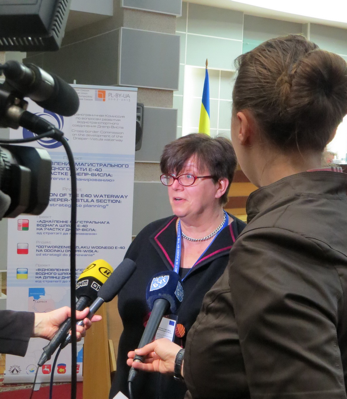
Ms. Martine-Sophie Fouvez, Regional Advisor of the UNECE Transport Division
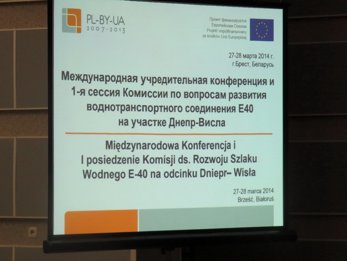

International conference in Brest gathered together more than 100 experts from Belarus, Poland and Ukraine

Mr. Sławomir Sosnowski, Deputy Marshal of the Lublin (Lubelskie) Voivodeship, Poland
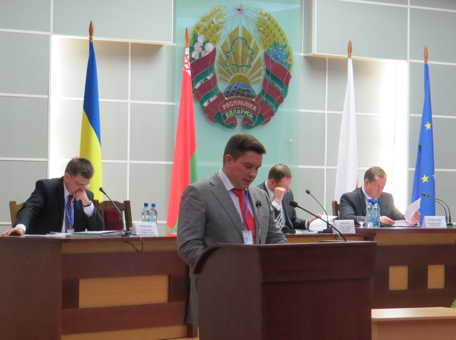
Mr. Ivan Shchadranok, Director of Local Foundation ‘Interakcia’, reads aloud the Declaration on support of activities aimed at comprehensive feasibility analysis of the E40 waterway restoration project
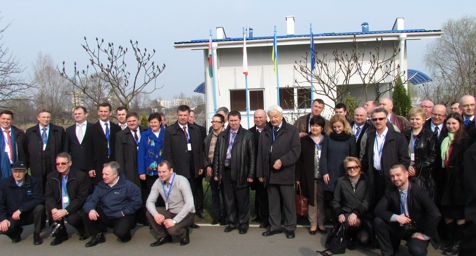
Conference participants near the new building which now hosts Secretariat of the Commission on the development of the E40 waterway on the Dnieper-Vistula section (Brest, Trishin water works facility).
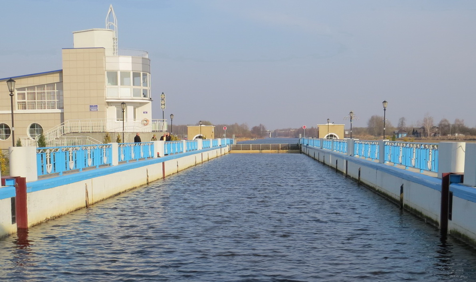
Hydraulic structures of the Dnepro-Bug waterway: Trishin water works facility, Brest
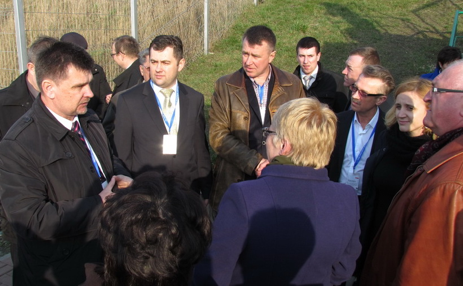
Mr. Nikolai Kotetski, Director General of Republican Unitary Maintenance and Construction Enterprise “Dnepro-Bug Waterway” tells about hydraulic structures of the Trishin water works facility
Project “Restoration of the E40 waterway on the Dnieper-Vistula section: from strategy to planning”
![]()
This project is funded by the European Union
